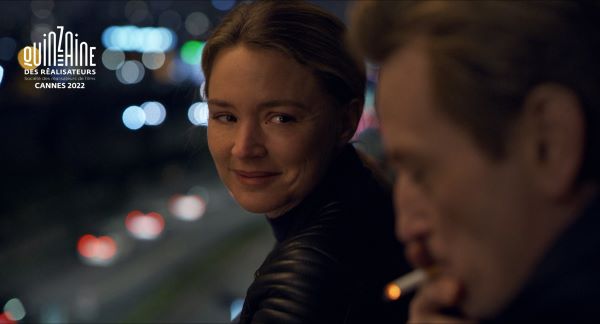![]() It took 10 days, but I finally found my personal favorite at this year’s Cannes Film Festival, and it wasn’t in the official competition. The Directors’ Fortnight sidebar, which is overseen by the French Directors’ Guild, presented Alice Winocour’s Revoir Paris (Paris Memories), as well as another festival find, Fogo-Fàtuo. Both selections achieved their narrative goals in their own idiosyncratic ways. Winocour’s other films have appeared in nearly every section at Cannes: Critics’ Week (Augustine), Un Certain Regard (Disorder), but her films have not yet been chosen as a Palme d’Or contender, though this new drama is much stronger than at least three films in that competition.
It took 10 days, but I finally found my personal favorite at this year’s Cannes Film Festival, and it wasn’t in the official competition. The Directors’ Fortnight sidebar, which is overseen by the French Directors’ Guild, presented Alice Winocour’s Revoir Paris (Paris Memories), as well as another festival find, Fogo-Fàtuo. Both selections achieved their narrative goals in their own idiosyncratic ways. Winocour’s other films have appeared in nearly every section at Cannes: Critics’ Week (Augustine), Un Certain Regard (Disorder), but her films have not yet been chosen as a Palme d’Or contender, though this new drama is much stronger than at least three films in that competition.
Its success lies largely upon the performance of Virginie Efira as Mia. In the first scenes of Mia’s everyday life—feeding a cat, going to work as a Russian-language translator, meeting up with her live-in partner (Grégoire Colin)—this Parisian, in her usual uniform of form-fitting jeans and black leather jacket, initially comes off as a blank slate of an Everyperson. However, the screenplay gradually develops her character moment by moment, making a possibly sensational and maudlin scenario credible, thoughtful, and moving.
On her way home on her motorbike, Mia takes a detour, finding refuge from a torrential downpour in a classy brasserie. Apparently, it’s quite the place to seen: A table of tourists take photos for their social media accounts. It is here where Mia and dozens of others become victims of a terrorist assault, in which multiple men roam the restaurant shooting anyone in sight—vividly but not graphically depicted. The filmmaker has a personal connection to terrorism: Her brother survived the 2015 Bataclan Music Hall attack, during which Winocour was in contact with him via text. Because Winocour focuses on the aftermath and recovery from such a massacre, there’s no mention of the motivations behind the killings. That would be another movie. (Certainly, this film probably has an added resonance, viewed only days after the mass shooting in Uvalde, Texas.)
Mia has no memory of how she survived—besides the mental trauma of the attack, she suffered physical scarring crawling through glass. So she takes tentative steps to piece to together what happened by joining a survivor group that meets once a week at the restaurant, L’Etoile d’Or. It’s like a large therapy group. At one meeting, a man recognizes her; she sat across from Thomas (Benoît Magimel) during his birthday celebration that night.
Thomas remembers her and motions to her to come to talk to him outside; he’s now claustrophobic and avoids indoor spaces. He also walks with a crutch with his left leg in a brace—he will have to have multiple surgeries. To Mia’s relief, Thomas reveals that he recalls observing her movements that evening: As she sat at the table enjoying a glass of white wine, she got black ink all over her hands and went to the bathroom to wash it off. But he doesn’t know what happened to her later, before the shooting began. However, one woman in the survivors’ group emphatically remembers Mia, and not in a flattering, but jarring light.
At first glance, the movie might play out like an archetypal tale of amnesia in which the person suffering the disorder might not accept the truth about the recovered memories. However, the sharp, to-the-point dialogue dispels any sense of melodrama. The screenplay by Winocour, Marcia Romano, and Jean-Stéphane Bron packs in a lot of information in layered, but terse one-on-one exchanges, such as an awkward moment between Mia and Thomas’s wife. In other instances, a small physical gesture reveals a lot. In doing so, the story line covers a lot of ground succinctly: the unraveling of relationships and the tough acceptance that nothing will be the same again for the survivors and their families. (The film’s original French title aptly translates as “Seeing Paris Again.”) Rest assured, though. There is humor and exuberance in Revoir Paris, especially when Mia and Thomas, her newfound confident (and more), crash a wedding reception.
Given that the selections in the main competition were overwhelmingly centered on men—though there were some exceptions (Holy Spider, Stars at Noon, Tchaikovsky’s Wife)—an opportunity was missed by not giving Winocour a slot. This omission is also perplexing given that her movie is as well made as some of the more conventional titles that were up for the Palme d’Or (Nostalgia or Armageddon Time).

















Leave A Comment